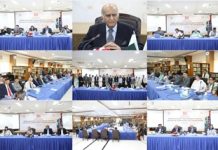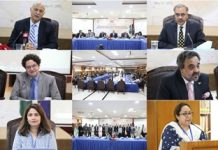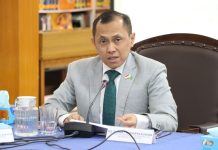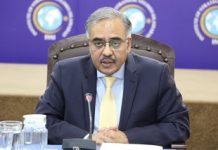Remarks by the Foreign Secretary, Ms. Amna Baloch, at Seminar titled “Kashmir Solidarity Day: A Commitment to Peace, Rights and Self-determination” and Inauguration of Kashmir Resource Center at the Institute of Strategic Studies, Islamabad (7 February 2025)
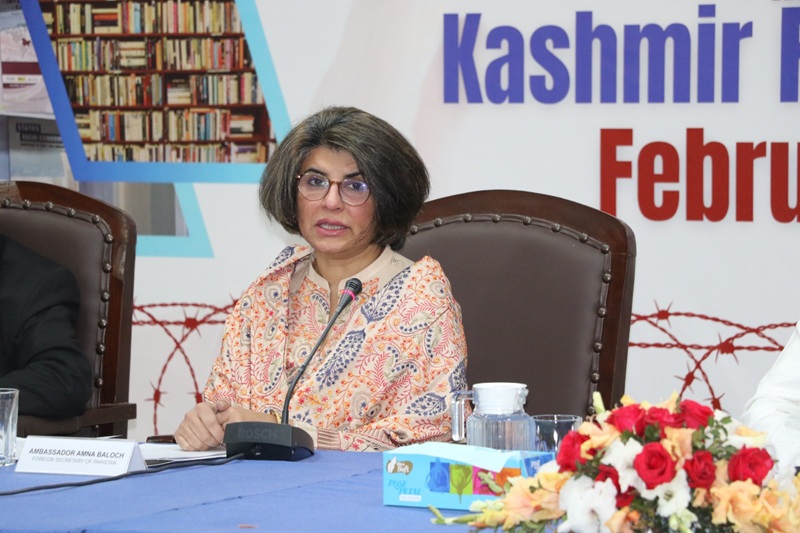
Ambassador Khalid Mahmood, Chairman, Board of Governors, Institute of Strategic Studies, Islamabad
Ambassador Sohail Mahmood, Director General, Institute of Strategic Studies, Islamabad,
Distinguished Guests,
Ladies and Gentlemen,
Thank you very much for affording me the opportunity to speak before this august gathering of diplomats, activists, researchers and academics
Today’s topic contains three key words: peace, rights and self-determination. All these words carry extreme significance in the context of the Jammu and Kashmir dispute.
Ladies and Gentlemen,
Self-determination is a key principle of international law denoting the legal right of people to decide their own destiny. The right to self-determination is an inalienable right guaranteed by the United Nations Charter and the International Covenant on Civil and Political Rights. Grant of fundamental rights and freedoms cannot be guaranteed in the absence of self-determination. The UN General Assembly has been adopting a resolution on self-determination for last several decades.
Unfortunately, the Kashmiri people have not been able to exercise this right during last 78 years due to indian intransigence despite the fact that the relevant UN Security Council resolutions call for grant of this inalienable right to them.
In accordance with Article 25 of the UN Charter, all Member States “agree to accept and carry out the decisions of the Security Council in accordance with the present Charter”. Besides, the UN Security Council resolutions can only be invalidated by fulfillment of the obligation – consent of the parties – or a subsequent resolution or decision of the Security Council. In the absence of any of these conditions, India cannot renege on its solemn commitment to the United Nations, to Pakistan and above all, to the Kashmiri people, regarding a free and impartial plebiscite under the UN auspices.
Ladies and Gentlemen,
Let me, now, digress towards the deplorable state of “rights” in Indian Illegally Occupied Jammu and Kashmir (IIOJK).
Today, the true representatives of the Kashmiri people remain behind the bars, with the total number of political prisoners being in thousands. Iconic Kashmiri leader, Syed Ali Shah Geelani, died during detention.The total period of the confinement of his successor, Musarrat Alam Bhatt, exceeds 20 years. Another well-known Kashmiri leader, Shabbir Ahmed Shah, has spent over half of his 71 years’ life in jails. The Indian authorities have sought death penalty for Mr. Yaseen Malik, who was awarded life sentence in 2022.
As if incarceration of popular leaders was not enough, the Indian authorities have been banning the political parties that represent the true aspirations of the Kashmiri people. So far, 14 political parties have been outlawed. The office of All Parties Hurriyat Conference in Srinagar remains sealed since 2023. The Srinagar Press Club was also shut down in 2022. Last year, the elections of the Jammu and Kashmir Bar Association were not allowed.
In an environment of fear and intimidation, freedom of expression remains seriously challenged. The local media has been made to follow the official line through different pressure tactics.
Draconian laws such as Public Safety Act (PSA), Armed Forces Special Powers Act (AFSPA) and Unlawful Activities (Prevention) Act (UAPA) offer impunity to the Indian forces to arrest or kill any person, and destroy any property. The UN Human Rights Committee has declared these law as incompatible with the International Laws.
Lately, the confiscation of properties has emerged as another instrument of penalizing the dissent.
These human rights violations are well-documented by human rights organizations and international bodies, including the UN Office of the High Commissioner for Human Rights and the Independent Permanent Human Rights Commission of the Organization of Islamic Cooperation.
A number of UN Special Procedures have also expressed concerns about different facets of this dismal situation. I especially recall the statement made by aformer Special Rapporteur on Minority Affairs, Dr. Fernand de Varennes, who rightly suggested in the run up to a G-20 Working Group meeting in Srinagar that India was providing a “veneer of support to a façade of normalcy” at a time when massive human rights violations, illegal and arbitrary arrests, political persecution, restriction and even suppression of free media and human rights defenders continued to escalate.
He had drawn an apt conclusion that the situation in Jammu and Kashmir should be “decried and condemned, not pushed under the rug and ignored.”
Ladies and Gentlemen,
I shall, now, turn to the third key word of today’s topic. Peace in the context of contemporary inter-state relations could be “negative” or “positive”. The “negative peace” refers to absence of violence but persistence of the conflict’s root causes. Meanwhile, the “positive peace” connotes a situation where underlying causes of a conflict are addressed, leading to justice and equity for all.
History bears witness that India’s continued occupation of the large parts of Jammu and Kashmir has threatened regional peace and stability on a number of occasions.So, the vision of a developed, peaceful and integrated South Asia will remain unfulfilled until Jammu and Kashmir does not experience the “positive peace”.
Undoubtedly, Pakistan believes in peaceful co-existence with its neighbours.However, a peaceful settlement of the Jammu and Kashmir dispute, in accordance with the UN Security Council Resolutions and aspirations of the Kashmiri people, is essential for a lasting peace in South Asia.
It is a matter of grave concern that the frequency of the Indian leaders’ irresponsible statements and unwarranted claims about Azad Jammu and Kashmir and Gilgit-Baltistan has increased during recent years. Around three weeks ago, the Indian Defence Minister termed Azad Jammu and Kashmir as ‘crown jewel’ of India. In the face of such provocative statements, Pakistan is acting in a mature and responsible manner.However, these irresponsible statements remain a destabilizing factor in the prevailing regional environment.
Ladies and Gentlemen,
In the last 78 years, India has made various attempts to strengthen its control over occupied Jammu and Kashmir. However, it has been making renewed efforts to consolidate its occupation since 5 August 2019. The objective is to undermine the territory’s internationally-recognized disputed status, and transform the Kashmiri people into a disempowered community in their own land. However, any process, which is subservient to the Indian Constitution, cannot be invoked to determine the final status of Jammu and Kashmir, which is an internationally-recognized disputed territory.
As Jammu and Kashmir is an international dispute, India’s legislature or its judiciary have no right to take unilateral measures against the will of the other parties to the dispute i.e. Kashmiri people and Pakistan.
Ladies and Gentlemen,
In the face of India’s ceaseless efforts to subjugate Kashmiris, Pakistan remains determined to play its role to support the right to self-determination of the Kashmiri people through a free and impartial plebiscite in accordance with the United Nations Security Council resolutions. Our strong and steadfast moral, political and diplomatic support for the Kashmiri people will continue till the realization of this inalienable right.
Before I conclude, I must congratulate Ambassador Khalid Mahmood, Ambassador Sohail Mahmood and their team at the Institute of Strategic Studies on establishment of the ‘Kashmir Resource Center’. As I commend this valuable initiative, I am confident that the Center will offer a useful repository of knowledge for the researchers and ordinary readers alike.
I thank you all!




